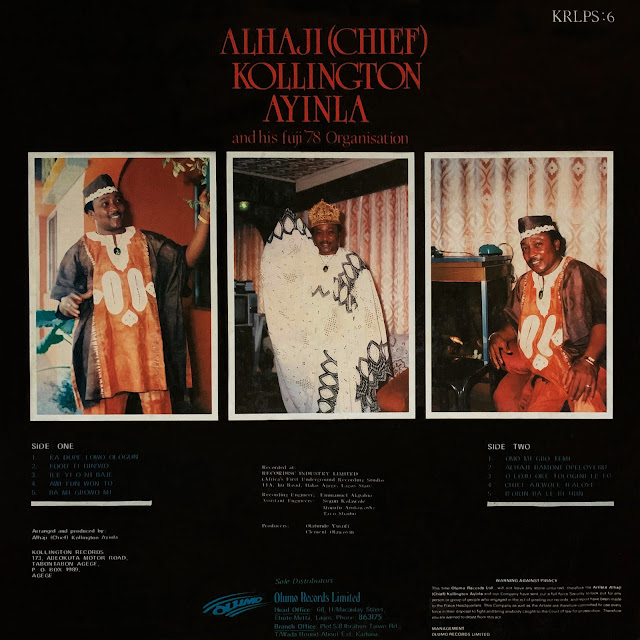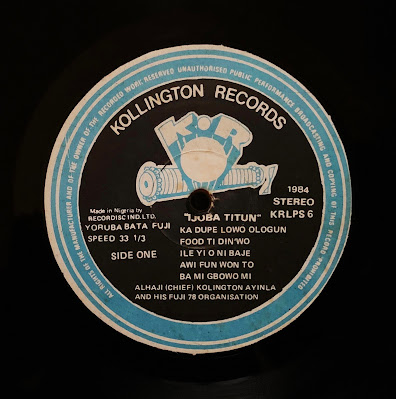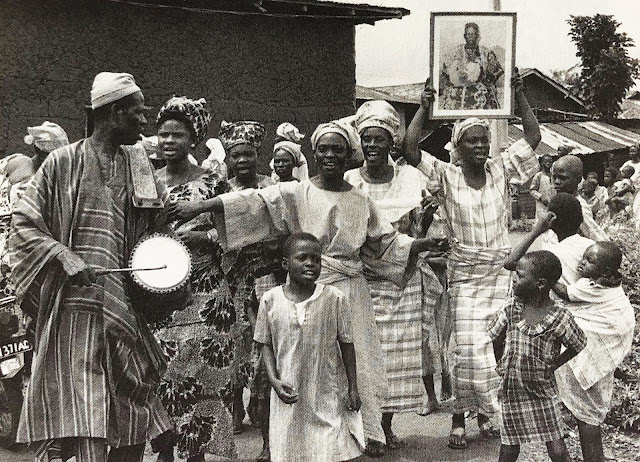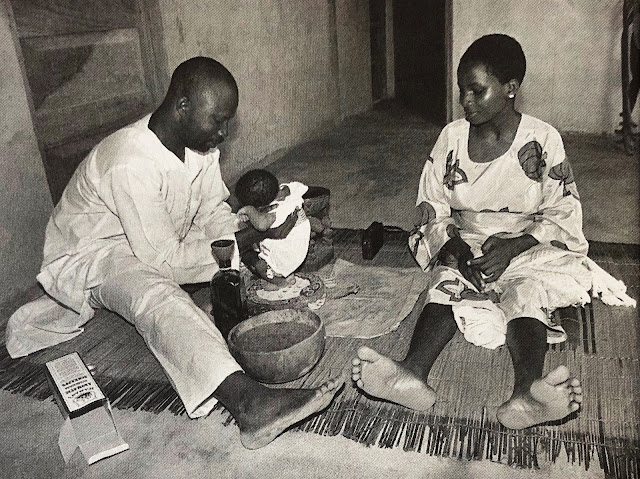NIGERIA – NIGÉRIA
Kollington Ayinla & His Fuji '78 Organisation – Ijoba Titun (new government) – KRLPS 6, 1984 (LP)
Singer and composer Kollington Ayinla, who was born in Ibadan in 1953, made a splash on the Nigerian music scene with his Fuji 1978 ensemble which innovated by adding a double-headed bata drum. According to Ronnie Graham, in The Da Capo Guide to Contemporary African Music (Da Capo Press, 1988), this gave his ensemble a distinctive new sound, that helped him emerge “from the shadow of [Sikiru Ayinde] Barrister and so began several years of intense rivalry between the two Fuji giants. With a slightly faster rhythm than Barrister, and a sharper lyrical attack on social injustice, Kollington soon established a devoted following.” The singer also launched his own Kollington Records label in 1982 and released over 50 albums during his career.
This 1984 LP includes excellent medleys with hypnotic polyrhythms and catchy angular agogo-bell motifs in constant flux behind backing vocals in response to Kollington’s powerful voice.
Le chanteur et compositeur de musique fuji Kollington Ayinla, né en 1953 à Ibadan, fait sensation sur la scène musicale nigériane avec son nouvel ensemble Fuji 1978 qui innova avec l’utilisation d’un tambour bata à tête double. Selon Ronnie Graham dans The Da Capo Guide to Contemporary African Music ((Da Capo Press, 1988), cela rendit sa musique immédiatement reconnaissable et permit à Kollington « de sortir de l'ombre de [Sikiru Ayinde] Barrister. Commence alors une longue rivalité intense entre les deux géants du Fuji. Avec sa verve lyrique s’élevant contre l'injustice sociale et un rythme un peu plus rapide que celui de Barrister, Kollington se trouve rapidement un large public enthousiaste. » Il lance également son propre label Kollington Records en 1982 et publia plus de 50 albums au cours de sa riche carrière.
Cet album de 1984 comprend des medleys inspirés avec des polyrythmes hypnotiques et des fascinants motifs de cloche agogo en flux constant derrière des choeurs répondant à la voix puissante du maître du fuji.
Our other Yoruba Fuji music shares:
Sikiru Ayinde Barrister – Vol. 6 – Africa Song AS 33-L, 1975 here
Sikiru Ayinde Barrister – Fuji Exponent Vol. 8 - AS 46-L, 1976 here
Sikiru Ayinde Barrister – Superiority – SKOLP 030, 1985 here
Dr. Wasiu Ayinde Barrister – Jo Fun Mi (Dance for Me) – OLPS 1361, 1990 here
Photographs below are from Yoruba Ritual – Performers, Play, Agency by Margaret Thomson Drewal, Replica Books, 1992:
A funeral “play” (ere) travels about the town. A member of the family carries aloft a photograph of the deceased. Ijebu area, village of Imosan, September 1986:
"Ositola 'centers the baby in the world' during a divination ritual known as Ikose w’aye (Stepping into the World) by placing its feet down in the center of the Ifa divination tray. Ijebu area, Imodi, October 1986.
After 'Stepping into the World,' the next critical ritual for children is Imori (Knowing the head), ideally performed within the first three month after birth. This time the objective is to learn the nature of the inner head (ori inu)–or personality. To unify a child’s personality, the parents must first of all know from where the soul comes. There are three possibilities: the father’s side of the family, the mother’s, or a deity. The latter soul is 'free' in that it is newly created."
purchase
important traditional records to pursue my global






Thank-you very much
ReplyDelete